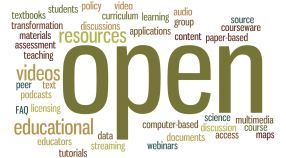What is OER?
Open educational resources (OER) are any resources available at little or no cost that can be used for teaching, learning, or research. The term can include textbooks, course readings, and other learning content; simulations, games, and other learning applications; syllabi, quizzes, and assessment tools; and virtually any other material that can be used for educational purposes. OER typically refers to electronic resources, including those in multimedia formats, and such materials are generally released under a Creative Commons or similar license that supports open or nearly open use of the content. OER can originate from colleges and universities, libraries, archival organizations, government agencies, commercial organizations such as publishers, or faculty or other individuals who develop educational resources they are willing to share.
Want to know more? Click here to watch a video overview of the OER movement.
Why is it significant?
Educational resources developed in an open environment can be vetted and improved by a broad community of educators, resulting in materials that represent what the educational community sees as most valuable. By providing educators with new access to educational material, open resources have the potential to spur pedagogical innovation, introducing new alternatives for effective teaching…
…By distributing the costs over a larger number of users, OER brings a greater range of tools within reach of more users. OER can also lower the costs for students to obtain educational content.
(7 Things You Should Know About OER)
Presentation on OER resources:
http://prezi.com/by1yqizljc2x/open-educational-resources/

Leave a comment